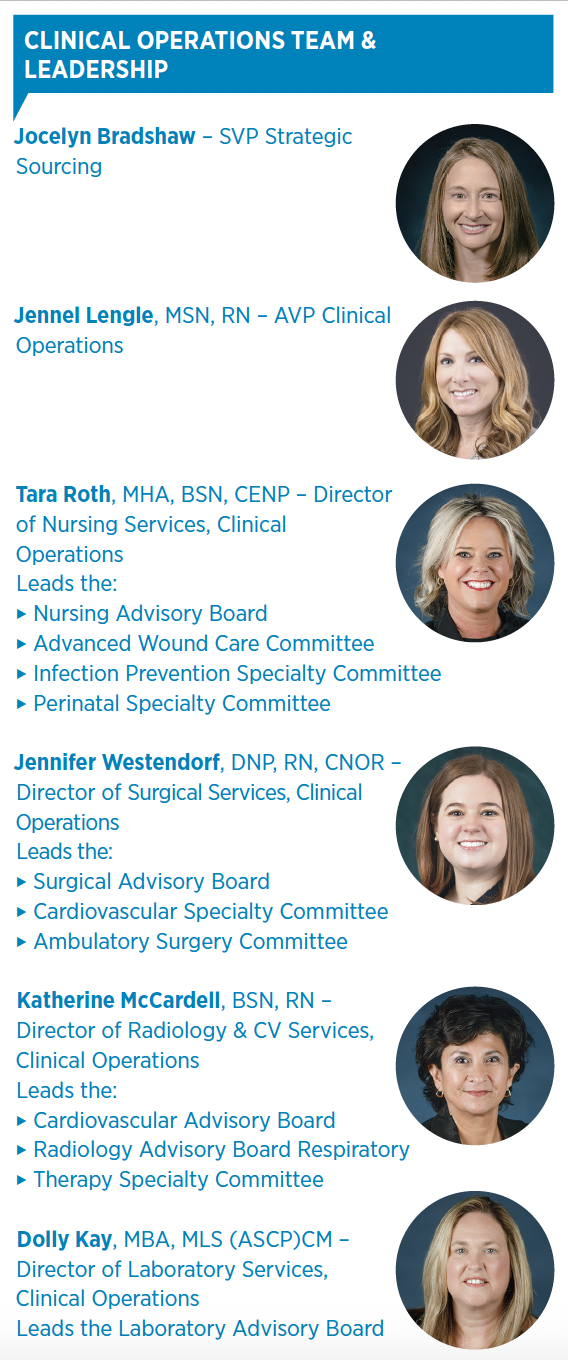The role of HealthTrust Clinical Advisory Boards in ensuring members they have access to the products they need
HealthTrust’s Clinical Operations team has four directors who lead member-based Clinical Advisory Boards and specialty committees. The Clinical Operations team assists in the sourcing process by merging their extensive professional experience with up-to-date knowledge of clinical processes and technologies. “Each of us has been a subject matter expert and leader in our particular disciplines and comes from an operational background,” says Jennifer Westendorf, DNP, RN, CNOR, Senior Director of Surgery. Because we are all clinicians and know the terminology, we can effectively collaborate with the experienced clinicians within the membership who serve on our Advisory Boards.
 Collaborating with the internal Strategic Sourcing team, the Clinical Operations team weighs in on contracts and purchasing strategies. Five Advisory Boards—Nursing, Cardiovascular, Radiology, Laboratory and Surgical—and six specialty committees cover the clinical categories within the portfolio. The Clinical Advisory Boards and committees discuss products from a clinical and operational lens. Depending on the category, they may also review clinical recommendations and guidelines, published clinical evidence and product samples before presenting their clinical recommendation to the Supply Chain Board. This multi-team collaborative approach ensures that HealthTrust’s contracts are awarded only to the highest-quality suppliers.
Collaborating with the internal Strategic Sourcing team, the Clinical Operations team weighs in on contracts and purchasing strategies. Five Advisory Boards—Nursing, Cardiovascular, Radiology, Laboratory and Surgical—and six specialty committees cover the clinical categories within the portfolio. The Clinical Advisory Boards and committees discuss products from a clinical and operational lens. Depending on the category, they may also review clinical recommendations and guidelines, published clinical evidence and product samples before presenting their clinical recommendation to the Supply Chain Board. This multi-team collaborative approach ensures that HealthTrust’s contracts are awarded only to the highest-quality suppliers.
“The foundation of the work we do at HealthTrust is based on the aligned decision-making of our membership,” says Jennel Lengle, MSN, RN, AVP of Clinical Operations. “Each of our Advisory Boards consists of 25 to 28 members who are subject matter experts within the space they’re representing. As a company, HealthTrust doesn’t make any decisions on contracting alone—those decisions are made by the Supply Chain Board members based on recommendations from related Advisory Boards. It’s important to understand that the boards act as a governing body, overseeing sourcing initiatives and representing the membership’s needs.”
Embracing change & a disrupted supply chain
The involvement of HealthTrust’s Advisory Boards became even more critical during the pandemic and its related supply chain disruption. Fortunately, the Advisory Boards’ combination of clinical experience and collaboration laid the foundation for nimble responses. “Everybody felt firsthand all the supply disruption issues and challenges. But a positive change came out of that,” shares Tara Roth, MHA, BSN, CENP, Director of Nursing Services for Clinical Operations. “It forced all healthcare associates to work more closely together, to be more agile and to realize they could use different products and understand how to rapidly implement those changes. I think we’re going to see a long-term shift there; knowing that you don’t have to keep using the same products that you always have. The pandemic really forced us to do that.”
Lengle agrees and considers this a long-term benefit. “Supply chain is front and center in a lot of our conversations, as is cost mitigation, utilization patterns and formularies. Increasingly members are sharing the partnerships that have emerged between their clinicians and supply chain in a more structured way. In the past, it was the larger health system members that had value analysis teams and processes—now organizations of any size are realizing the benefits.”
Moving past the pandemic, healthcare providers are particularly concerned with understanding the current state of the market and mitigating future risks to the supply chain. “The experience and insight from our collective membership, is invaluable,” says Lengle. “They continue to offer a real-time, frontline perspective on how supply disruption affects them—from deciding which strategies best meet their current challenges to the potential impact of pivoting to alternative product options.”
Staying informed & educated
Advisory Board members and the Clinical Advisory Board directors gain insights about those impacts by participating in the Advisor group on the HealthTrust Huddle platform. There, HealthTrust members post questions and seek answers about emerging technology, processes and operational concerns. The HealthTrust Huddle Advisor group also hosts surveys to obtain feedback on products, services or processes related to the service lines represented by our contract portfolio. “HealthTrust members don’t have to have a board seat to utilize the platform; any member can share or seek insight from the tool,” adds Lengle.
“We utilize information from the Huddle’s message boards to help us make the decisions for the greater good of the membership,” says Lengle. “Many of the people posting have different areas of expertise than our staff subject matter experts. Their voices are heard and shared so that we all learn. That knowledge is translated into contract launch packages, award summaries and other resources that can help the larger membership.”
The Clinical Operations directors who lead the Advisory Boards also stay current in an ever-changing industry by maintaining memberships in professional organizations, engaging in continuing education and attending conferences. For example, the Nursing Advisory Board recently attended NTI—National Teaching Institute—to investigate new technology in virtual reality education, slings, patient monitoring and infusion pumps.
Participating in the conference “enabled the Nursing Advisory Board members to have one-on-one time with suppliers for deeper conversations. Finding out what products are in development gives us the opportunity to be forward-thinking,” adds Roth. “Exploring the emergent technology at these events enables us to think about category expansion or new categories we may want to consider adding to the contract portfolio.”
Share Email Laboratory, Nursing, Operations, Q3 2023





